This fifth edition of our annual review, compiled entirely from material from this newspaper, looks back at the Old Year in the very first newspaper of the New. If 2020 was one of those unforgettable years everybody would like to forget, a likewise pandemic-stricken 2021 was hardly less remarkable. So without any further ado, here goes, week by week:
– JANUARY –
WEEK 1. The year kicks off with the government restricting nightlife in its first week and with initial coronavirus data of 43,163 deaths and 1,613,928 confirmed cases of contagion – the latter figure would be more than trebled and the former almost in the course of the year. With the start of an electoral year the 2020 dilemma of President Alberto Fernández between the economy and life promptly becomes a trilemma. His veep’s double pension as ex-president and presidential widow is already an issue, even if barely topping a million pesos including vice-presidential salary (as against the 14,000 pesos of pensions for the handicapped), not the 2.8 million pesos for just the twin pension now – a telling comment on inflation. President Fernández is already hinting at an export ban with his beef about beef, inaccurately ascribing European prices to local steaks. Other news flashes in a summer holiday week amid lockdown are INADI anti-discrimination agency head Victoria Donda’s irregularly employed maid and Japanese Foreign Minister Toshemitsu Motegi’s visit – he becomes the first foreign visit in almost a year. The 'blue” dollar kicks off the year at 160 pesos with country risk at 1,375 points as Entre Ríos skipped interest payments on provincial bonds worth US$500 million.
W2. A microscopic virus continues to bulk large in the news as Covid-19 deaths top two million worldwide and 45,000 here. Three of the four main farm lobbies impose a three-day grain marketing lockout in the first three days of the week to protest the suspension of grain exports. The INDEC national statistics bureau defines 2020’s inflation rate as 36.1 percent. Abortion (approved by Congress right at the end of 2020) is promulgated by the presidential signature.
W3. In a week in which most eyes worldwide are on Joe Biden’s inauguration in Washington DC, President Alberto Fernández receives his first Sputnik V jab. Human rights violations resulting from Formosa’s quarantine overkill start to become a national issue. YPF state oil firm moves from the presidential to the vice-presidential orbit as its chief Guillermo Nielsen, personally recruited by President Fernández, is replaced by Pablo González (the lieutenant-governor of Santa Cruz Governor Alicia Kirchner’s first term, no less) while at the same time YPF is forced into rescheduling its debt by the Central Bank’s capital controls the previous spring. A primary fiscal deficit of 6.5 percent of Gross Domestic Product is revealed for 2020 with Economy Minister Martín Guzmán announcing this year’s target as 4.5 percent.
W4. The government’s three keys for clinching midterm victory (as leaked by unofficial sources rather than formally announced) – mass vaccination, a positive growth rate for the first time since 2017 and an agreement with the International Monetary Fund (IMF) – are already faltering before the first month of 2021 is out. Not so much 2021 growth, which is seen as inevitable after the previous year’s double-digit shrinkage (well OK, minus 9.9 percent officially), but a vaccination programme facing massive delays with a supply measured in millions of doses falling so short of the multi-billion global demand (with Britain’s Covid-19 deaths entering six digits that week) while Guzmán’s pursuit of an IMF agreement is not accompanied by the more populist Frente de Todos sectors now entering campaign mode with surging world commodity prices lending more of a margin. The veep’s turn for her Sputnik V jab (one of only 220,000 delivered that week), delivered by then Buenos Aires Province Deputy Health Minister Nicolás Kreplak, who gushes about “our dearest Cristina Kirchner offering her shoulder as always in her infinite solidarity and love.” President Fernández signs an agreement with meatpackers, supermarkets and butchers to lower beef prices by up to 30 percent and pays a cordial two-day visit to Chile. Abigail Jiménez, 12, the terminal cancer patient who two months previously had to be carried across the Santiago del Estero border by her father in defiance of lockdown, dies in the last hours of the month.
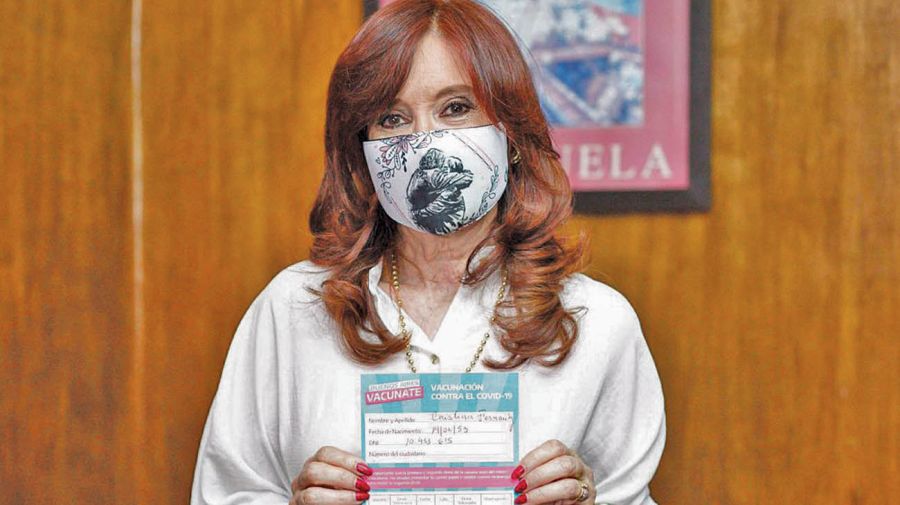
– FEBRUARY –
W5. Argentina braces for a second wave of Covid-19 by betting heavily on the Sputnik V vaccine, which announces future production in Argentina, precisely in a week in which Russia’s Vladimir Putin throws Kremlin critic Alexey Navalny into jail. In the same week a bulk purchase of 30 million doses from China falls through with the government pleading it can only afford a million. Formosa stays in the news with the arrival there of a trio of opposition deputies to probe charges of human rights violations by Peronist Governor Gildo Insfrán, dubbed the “Angela Merkel of Argentina” by Senate Majority Leader José Mayans on the grounds of his political longevity. Good courtroom news for former vice-president Amado Boudou (whose wedding planner and other prison courses lead to 10 months being shaved off his 70-month sentence) but bad courtroom news for the current veep, whose double pension is halved by a judge. María Estela Martínez de Perón aka ‘Isabelita’ turns 90, thus becoming the second ex-president born in La Rioja to complete nine decades after Carlos Menem the previous July. An extremely rare twist on money markets as the parallel “blue” dollar closes the week below the official exchange rate if the latter’s 65 percent surcharges for savers are added – signs of a quiet, if pandemic-stricken summer.
W6. By the end of this week the pandemic has notched up two more grim landmarks – two million cases of coronavirus and 50,000 deaths. The year’s first monthly inflation figure – four percent for January – was already killing hopes of inflation continuing its pandemic-assisted downward path between 2019 and 2020 with the 2021 Budget forecast of 29 percent and the accompanying wage restraint already in deep trouble. The socio-economic pact sought by President Fernández at this stage (holding sectorial talks with farming and business leaders and trade unionists in the course of the week) is likewise jeopardised – consensus continues to be a magic word without asking: consensus over what (ultra-subsidised utility billing or the wealth tax?). The nagging issue of crime in its two hotspots of Rosario and Buenos Aires Province makes its first major appearance of the year in the latter in the small town of Rojas with the brutally lethal stabbing of Ursula Bahillo (19) by a suspended Buenos Aires provincial policeman despite a restraining order, bringing femicide to the fore yet again. The Chamber of Deputies approves by a 223-2 vote a bill mandating parliamentary approval for any debt agreement (including with the IMF).
W7. Until its closing hours this was just another relatively calm summer week with its salient news the passing of Carlos Menem (1930-2021) on Saint Valentine’s Day the previous weekend, just 10 days after his La Rioja predecessor Isabel Perón turned 90 – Argentina’s first post-modern president in the final decade of the last century and perhaps the closest this country has come to liberalism in the current democratic era until now. As it draws to a close, Health Minister Ginés González García even has every reason to feel well satisfied with a week featuring the mass vaccination of the 70-plus age group finally starting the previous day while on Ash Wednesday five of the country’s 24 districts (including this city) re-open classroom doors but then all hell breaks loose as the venomous Horacio Verbitsky suddenly starts confiding in radio interviews that “his good friend the minister” has fixed up jabs at Health Ministry offices allowing government officials and supporters including himself, to jump the queue – within a couple of hours González García’s resignation is requested and on the table as the VIP vaccine scandal is born. Otherwise not much news during Carnival week (which sees three million tourists, taking the total thus far that summer up to 11 million) – the first (and entirely vacuous) meeting of the much-vaunted Socio-Economic Council is held while the government hurls hoarding charges at several companies as it jacks up YPF petrol prices for the fourth time in six weeks.
W8. The week is dominated by the aftermath of the ‘VIP vaccine’ scandal without even a whisper of apology from the government – González García is replaced by his deputy minister Carlos Vizzotti, who tests positive for Covid-19 only six days later and goes into isolation. The iconic conviction of Kirchnerite tycoon Lázaro Báez, sentenced to 12 years in prison for money-laundering in the course of hogging Patagonian public works contracts, places President Fernández even further on the back foot in the immediate prelude to his state-of-the nation speech – no wonder he chooses to spend much of that week visiting Mexico. The ANSES social security administration seeks to accelerate judicial overhaul by giving judges processing their retirements 30 days to complete them or face jeopardising their pensions.
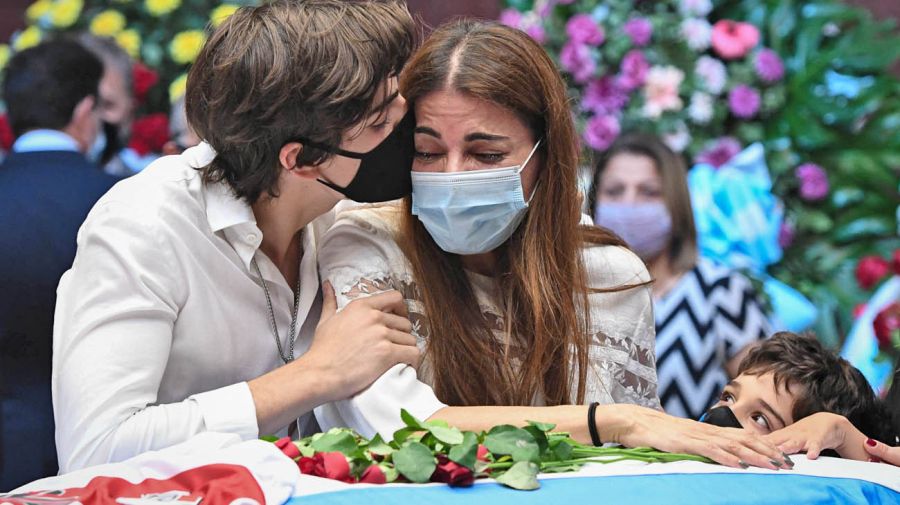
– MARCH –
W9. The presidential address to open Congress on the first day of the month has competition as a state-of-the nation speech – just four days later Vice-President Cristina Fernández de Kirchner utters a war-cry of almost an hour against “lawfare” and “a rotten and perverse judiciary.” A booster jab, perhaps, because President Fernández does not lag behind in placing judicial reform on the front-burner of his Congress agenda while crowning his strategy of blaming everything on his predecessor Mauricio Macri by pledging legal action against his administration for incurring the US$44-billion debt with the IMF (a lawsuit already exists, if dormant), describing it as “the biggest scam in Argentine history” – an attempt to eclipse the ‘VIP vaccine’ scandal? Perhaps because of that need for distraction, a coronavirus pandemic claiming almost 53,000 lives is given short shrift in the state-of-the-nation address. Three-quarters of the country’s districts (including Buenos Aires Province with over 2.5 million schoolchildren) have begun classes by the end of the week but in Formosa the demonstrations against an ultra-stringent quarantine start escalating. Pensions are hiked 8.07 percent for the first quarter of this year with bonuses of 1,500 in April and May for minimum pensions – January’s industrial output is also announced as 4.4 percent up from the first month of 2020 before the pandemic. Meanwhile the “blue” dollar keeps slipping downwards to 50 pesos below last spring’s peaks but country risk rises over 60 points in reaction to a state-of the-nation speech threatening to sue the IMF.
W10. While Formosa stays turbulent, the government starts hinting at intensified restrictions nationwide in response to the “worrying” increase in Covid-19 infections across Latin America, already cracking down on international flights. The Tuesday sees chaotic scenes outside the Luna Park vaccination centre with several times the 2,100 people aged over 80 scheduled for that day due to cumulative delays (and perhaps some opportunism) while prominent intellectual Beatriz Sarlo’s airing her invitation to receive a quick jab keeps the ‘VIP vaccine’ scandal in the news – this is joined in midweek by a new scandal surrounding the unauthorised withdrawal of 12 million pesos in cash in bags from the bank account of RTA (state broadcasting). The “blue” dollar keeps falling (to 141 pesos) with a fiscal surplus thus far in the year with revenue increases of 53.3 and 51.9 percent for the first two months of the year, well ahead of inflation, but the latter is increasingly a problem with 3.6 percent posted for February or an annual inflation topping 40 percent as against the 29 percent enshrined in the 2021 Budget. Guzmán thus faces the dilemma of these inflation levels driving a coach and horses through any incomes policy or making the 29 percent stick by pressing the many state buttons at his disposal (thus risking the incipient economic recovery). Meanwhile Guzmán looks to winning brownie points with the IMF with his fiscal surplus – even if achieved via increasing taxation and skipping debt service while Macri surpluses were accompanied by tax cuts and debt payments. Further down the ladder around 60 percent of provincial bond debt is estimated to be in default.
W11. Another one bites the dust – Justice Minister Marcela Losardo has to go despite being a lifelong law practice partner of President Fernández for not implementing judicial reform with a velocity corresponding to vice-presidential needs (half of the only four female members of the original 20-strong Cabinet have thus been bounced in an administration firmly pledging gender equality). What other government in a pandemic-stricken planet defines judicial reform as its top priority? Losardo is replaced by abrasive Río Negro Peronist deputy Martín Soría, whose verbal fireworks are not accompanied by any results in the rest of the year. The week ends with the first anniversary of quarantine (even if the Q-word has vanished from official discourse), which finds the government on the defensive due to vaccine delays – only six percent of the contracted doses have arrived. President Fernández could be forgiven a certain nostalgia for the first stages of that quarantine which saw ‘Captain Alberto’s’ popularity ratings soar as high as 84 percent – they are around half that now (with his van stoned on a visit to Chubut). Neither the vaccine delays nor the approach of a second wave of coronavirus serve to prevent an increasing relaxation of quarantine overkill in the closing weeks of summer with weekly death tolls still in three digits. Ex-president Macri launches his book Primer Tiempo. A good news week for Vice-President Cristina Fernández de Kirchner with not only the ministerial change but also the Supreme Court upholding her lawsuit against Google after recovering her double pension in the past month – in a generous mood, she waives her vice-presidential pay packet. The “blue” dollar finally reverses its downward trend but country risk falls almost 100 points, to 1,537.
W12. The government presents an autistic face to the outside world. Its presidential half defies a testy online Mercosur summit (marking a less than happy 30th anniversary with no final statement) by defending a common external tariff of 14 percent almost trebling the world average and import substitution models against the greater flexibility favoured by Uruguay and Brazil. Meanwhile its vice-presidential half insists that the “impossible” and “unacceptable” IMF debt cannot be paid just when Guzmán is negotiating it in Washington. In the same week (on the human rights holiday marking the 45th anniversary of the 1976 coup, no less) the Fernández presidency exits the Lima Group seeking a democratic solution to Venezuela’s woes after taking 16 months to conclude that it is useless – this also indirectly torpedoes Guzmán’s talks in Washington with the United States a decisive voice on the IMF’s board. Elsewhere, the Frente de Todos caucus pulls out all stops in Congress to block extension of Néstor Kirchner’s 2006 biofuels bill, which had just been approved by the Senate dominated by his widow. The dreams of a Vaca Muerta shale cash cow to solve all problems account for this paradox of a government frustrating its own legislation – Frente de Todos caucus chief Máximo Kirchner is hard at work on a new bill to reduce biofuels to an artisan scale on the pretext of favouring PyMEs (small and medium-sized companies) while fully a quarter of the wealth tax allegedly against the pandemic is earmarked to giving oil giants incentives to develop Vaca Muerta. The debate on biofuels crosses party lines, depending more on whether deputies come from oil-rich or farming provinces. On the coronavirus front regional flights are indefinitely postponed while intensive care patients include veteran C5N newsman Víctor Hugo Morales. Home office for the public sector and nocturnal curfews in some 40 districts (including this city and three provincial capitals) are ordered as from Palm Sunday with over 14,000 cases (the highest since October) the following day. INDEC edges down the double-digit economic shrinkage initially calculated for the year 2020 to 9.9 percent. A bill raising the income tax floor to a monthly 150,000 pesos is approved by 241 of the 257 deputies – electioneering is already overtaking fiscal balance to smooth debt negotiations as the prime consideration even if the first quarter ends with deficit reduced to the levels left by Macri while the printing of money has slowed drastically.
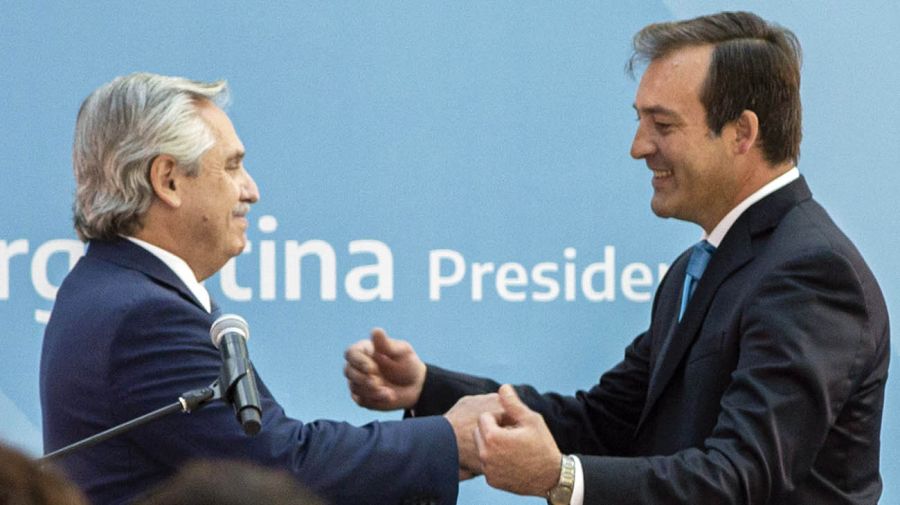
– APRIL –
W13. Easter is the month’s first weekend and the poverty so close to papal and ecclesiastical hearts is among the dominant themes that week as INDEC reports 42 percent below the poverty line in the second half of 2020 with 10.5 percent destitute – even more frightening, that figure rises to 57.7 percent below the age of 15. At the same time, the bureau quantifies Argentine money beyond the financial system either at home or abroad at US$250.4 billion. Short-term prospects of improvement do not look good with this year’s economic rebound seemingly unaccompanied by investment or job creation. Greater Buenos Aires (the only urban zone in the country with majority impoverishment apart from the Chaco provincial capital of Resistencia) and other urban sprawls are often worse hit by lockdown than backward provinces whose numerous employees are at least paid on time. Good Friday coincides with the 39th anniversary of the outbreak of the South Atlantic War.
W14. With the confirmed cases of coronavirus contagion throughout this week hitting six digits (and deaths four digits), President Fernández – who had himself tested positive for Covid-19 in the middle of the Easter weekend despite having received both his Sputnik V jabs – in midweek orders a nationwide curfew for the first six hours of each day for the next three weeks except for essential workers, along with a host of other restrictions. Not an easy decision for the president in the week after his birthday, with the previous year’s economic havoc recently made known by official data only just eluding double digits – “April is the cruellest month,” as T.S. Eliot wrote. The income tax cut is approved by 66 of the 72 senators. Otherwise little major news to report as lockdown begins its comeback among a more exhausted economy and citizenry. Abroad Prince Philip expires just two months short of his century.
W15. Lockdown turns into a political battlefield as President Fernández stands by his restrictions with intensive care wards already under severe strain while City Hall battles to overturn the ban on classroom schooling (imposed in midweek for the rest of the month without consulting regional authorities) with the opposition arguing the insanity of omitting education as an essential activity while airing suspicions of capitulation to teacher union pressure – hundreds protest outside Olivos presidential residence. The substandard quality of most Zoom classes fails to accelerate the transition between classroom and digital learning which could have been an involuntary benefit of the pandemic. Nevertheless, the coronavirus data are giving the national government grounds for being obdurate – the daily death toll is now into three digits, including the fighting fit television journalist Mauro Viale aged 73. Yet the pandemic is not the only worry as INDEC announces 4.8 percent inflation for March, the highest in 18 months. The Cassation Court quashes the dollar futures case against Vice-President Fernández de Kirchner (among others) on the grounds that it was based on a political decision of the ex-president since courts do not have the right to sit in judgement on the policies of elected governments, no matter how bad.
W16. Coronavirus threatens to resemble that iconic Japanese painting, Hokusai’s The Great Wave off Kanagawa, with the week’s death toll topping 2,000, reaching the 60,000 mark in midweek and moving well beyond – despite the general quarantine fatigue there are also political pressures for more restrictions. The gravity of the health crisis prompts the Juntos por el Cambio opposition coalition to accede to postponing the PASO primaries from August 8 to September 12 and the midterms from October 24 to November 14. President Fernández participates in the first of various Zoom summits on climate change prior to November’s COP26 in Glasgow and in all of them his song remains the same – his anxiety for “a new international financial architecture” (i.e. debt relief) far outweighs any environmental concerns, which in turn are largely lip service (thus his pledge to make 30 percent of energy renewable by 2030 comes on the same day as the Frente de Todos caucus presents its bill to limit biofuels).
W17. In the closing hours of the month, President Fernández extends the ongoing restrictions for a further three weeks as the second wave of Covid-19 continues to gather steam – more alarming than ever because whereas last year’s pandemic mostly killed off the extremely old nearing their ends anyway, almost 60 percent of coronavirus patients in intensive care are now aged under 60. City Mayor Horacio Rodríguez Larreta defiantly tells the government that classroom schooling will continue in his jurisdiction unless the Supreme Court rules against, although proposing a “mixed model” at secondary level. The second wave sees government support down to around a third of the electorate (pretty much the level in the actual voting several months later) as vaccination delays batter presidential credibility while the economic rebound from last year’s plunge loses its air of inevitability with renewed lockdown. The Frente de Todos Cabinet loses its fourth member – this time to a road accident killing Transport Minister Mario Meoni, 56, while commuting home to Junín for the weekend. He is replaced by his TAI railway chief Alexis Guerrera (both the old and new ministers are closely linked to Speaker Sergio Massa). The Minimum Wage Council agrees to raise the pay floor of a monthly 21,600 pesos by 35 percent over the next 10 months. Protesting Neuquén health workers finally lift a three-week road blockade which had badly hit the distribution of Vaca Muerta shale oil. Senator Esteban Bullrich explains his growing speech impediments of recent months by revealing that he has ALS (amyotrophic lateral sclerosis). The “blue” dollar reaches 150 pesos.
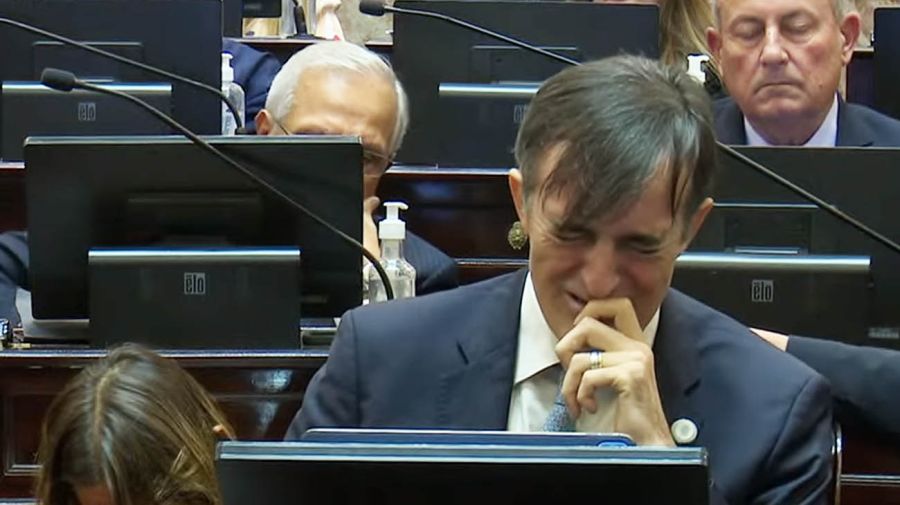
– MAY –
W18. The Supreme Court rules in favour of City Hall over classroom schooling, prompting President Fernández to draft a bill granting him superpowers against the Covid crisis as the week closes while his veep blasts the hostile ruling as an “institutional coup.” A no-win situation for Argentina’s legal security when a government openly displays contempt of court while the judiciary arrogates the right to deny an elected government emergency powers against an evident crisis even if the ruling has the merit of freeing children from pedagogic house arrest and is constitutionally impeccable in upholding local and provincial autonomy. Guzmán seeks to dump his Energy Undersecretary Federico Basualdo for his inaction over segmenting public utility billing in order to limit subsidies to the socially disadvantaged but runs into a brick wall from Kirchnerism, spearheaded by Buenos Aires Governor Axel Kicillof. Energy Secretary Darío Martínez had previously delivered a report indicating that a 31 to 35 percent increase in utility rates was required to correct relative prices but Vice-President Fernández de Kirchner insists that nothing beyond single digits is electorally viable. The Social Observatory of UCA Catholic University estimates those below the poverty line at 52 percent of the population, not 42 like INDEC. Despite a conviction for corruption, Boudou gives classes at the University of Buenos Aires (UBA).
W19. President Fernández spends the week in the Old World mustering support for Argentina’s stance in debt negotiations, obtaining from European heavyweights the kind of moral support he himself is so ready to offer and of similar value in most cases and meeting up with IMF Managing Director Kristalina Georgieva in Rome. Apart from the latter, his contacts include both Iberian socialist premiers, Portugal’s Antonio Costa and Spain’s Pedro Sánchez, French President Emmanuel Macron (more guarded), Italian premier Mario Draghi (generally and vaguely supportive) and, of course, Pope Francis, enlisting his support for IMF and Paris Club negotiations. He leaves plenty of turmoil behind him back home. The grim Covid-19 death toll ends the week on the brink of 70,000, including Santa Fe ex-governor Miguel Lifschitz. Kreplak proposes postponing second doses indefinitely, given the vaccine shortages, while Treasury Prosecutor Carlos Zannini revives the ‘VIP vaccine’ scandal by saying that he has nothing for which to apologise, despite posing as a health-worker to grab his jab. Meanwhile, the presidential superpowers bill is sent to Congress at the start of the week but runs into the elementary legal obstacle of no executive or legislative action being empowered to override the Constitution while the opposition offers no constructive alternative for fighting the pandemic alongside raising these valid objections. The bill also faces the more basic obstacle of lacking any overall majority in Congress, causing as many problems as offering solutions. April inflation weighs in at 4.1 percent, less of an improvement on March than had been hoped – core inflation (excluding seasonal and regulated prices) is 4.6 percent. But good economic news for the government from another front – global soy prices top US$600 per ton for the first time in nine years. A pension hike of 12.12 percent for the second quarter of the year is announced. Daniel Funes de Rioja,75, head of the Copal food industry chamber (a sensitive sector), is elected the next president of the UIA Argentine Industrial Union.
W20. President Fernández orders a short but strict lockdown for the last nine days of the month as Covid-19 cases soar, intensifying restrictions to the utmost to only permit essential activities with restaurants limited to deliveries and curfew extended to 6pm to 6am – all classroom education is banned, along with all social meetings, sporting and religious activities, etc. Despite general quarantine fatigue, the move seems to gain reluctant public acceptance due to the rapid acceleration of coronavirus cases with the daily death toll sometimes topping 700 (and entering into seven digits for Latin America as a whole that week). By a curious numerical coincidence nine days is also the length of the halt in cattle sales called by breeders to protest the government’s month-long ban on beef exports ordered at the start of the week (despite the proven failure of that strategy between 2006 and 2009). Meanwhile the Senate debates the size of the majority needed to appoint a new attorney-general while Congress approves the postponement of the midterms to November 14 by a 223 to 3 vote.
W21. The second wave of coronavirus continues to surge during the week of strict lockdown with over 3,000 deaths, moving past the 75,000 mark on the May 25 public holiday marking the birth of Argentine nationhood, a day chosen by thousands of citizens to protest the new restrictions while opinion polls show majority disapproval of government handling of the Covid-19 crisis as its clear bias towards Sino-Russian vaccines is increasingly questioned. The opposition insistently blasts the government for having turned down 14 million doses of Pfizer vaccine six months ago (even if worldwide delays cast doubts over whether they were actually available), which PRO party chair Patricia Bullrich attributes to previous minister González García having pumped the US lab for bribes (President Fernández vows to sue her). The week’s dire data also conspire against public acceptance of the new restrictions, even if they reflect previous weeks. President Fernández Zooms German Chancellor Angela Merkel in midweek to seek her support for Paris Club and IMF negotiations (Germany is owed three dollars of every eight in the former debt), afterwards giving his own positive version of their 40-minute talk – at this stage fiscal policy still remains relatively austere with state pay and pensions raised by little over half of inflation in the first third of the year while almost no money has been printed thus far in 2021. Máximo Kirchner briefly enters hospital with kidney stones (needless to say, a private clinic – La Plata’s Italian Hospital). CONMEBOL decides against hosting the Copa América in Argentina, opting instead for Covid-ravaged Brazil.
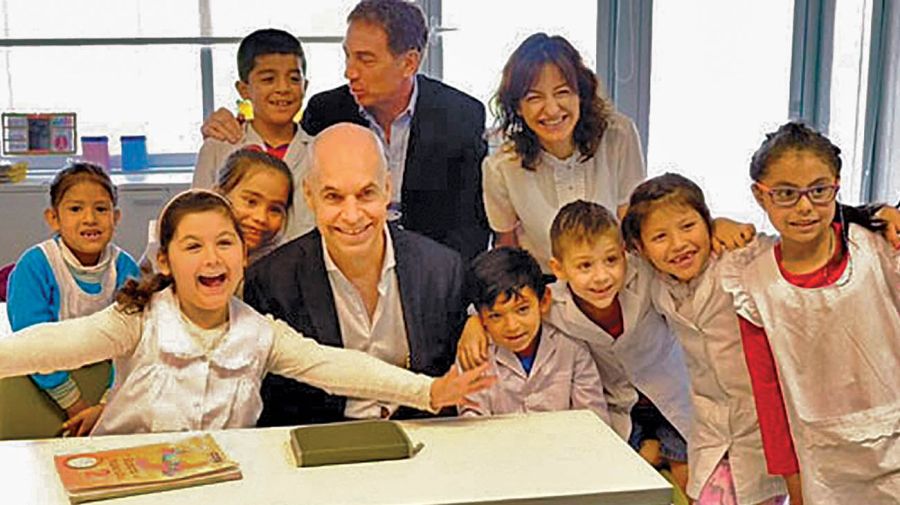
– JUNE –
W22. Argentina’s Covid-19 death toll surpasses 80,000 on the same day President Fernández and his Russian counterpart Vladimir Putin confirm the production of Sputnik vaccine in Argentina with effusive expressions of gratitude from the former. Government optimism that the vaccination campaign, a complete state monopoly, will be on track in time for the postponed midterms (confirmed that week in the Official Gazette following rapid Senate approval) starts to grow while a temporarily halted economic recovery has not progressed enough to reduce widespread dependence on the state.
W23. President Fernández extends Covid-19 restrictions until June 25 at the end of a week with over 4,000 deaths while the total of confirmed cases tops the four million mark but instead of enforcing them nationwide, the emergency decree divides the country into four zones – low, medium and high risk and epidemiological alert. Various local leaders give themselves the benefit of the doubt within these parameters – City Mayor Rodríguez Larreta re-opens primary schools, extends hours for restaurants and bars and reduces curfew to seven hours among other moves to relax restrictions while Kicillof announces a “gradual” return to classroom schooling in Buenos Aires Province (belatedly waking up to the extreme unpopularity of school closures). In midweek the President blunders into perhaps his gaffe of the year as he stuns visiting Spanish premier Pedro Sánchez with his inaccurately attributed quip: “Mexicans come from the Indians, Brazilians out of the jungle but Argentines off boats.” Despite the Paraná River now being down to below a half of its historical average depth, grain exports bring in a record US$ 13.3 billion in the first five months of the year (overtaking the previous 2016 record of US$11 billion) as the worldwide dollar glut to counter the pandemic drives money in that direction. But City Hall presents a bleaker picture of an “opulent” capital with 26.5 percent below the poverty line and the middle class under 45 percent since the pandemic (with the upper class now down to 8.6 percent). The first midterm voting of the year at provincial level is held in Misiones with the locally dominant Renewal Front (a neo-Peronist party) winning almost half the vote, Juntos por el Cambio a quarter and a Kirchnerite list 14 percent.
W24. Some corners are turned in the pandemic with Laboratorios Richmond announcing production of the first batch of Sputnik vaccine (almost 450,000 doses and rebranded Sputnik VIDA for the local market) while City Hall reopens cinemas, theatres and cultural events to 30 percent of capacity. Around three-quarters of Buenos Aires Province schoolchildren are now back in class. The government’s double standards on human rights abroad is an issue throughout the year but there is more noise than usual in this week when Argentina fails to join an Organisation of American States (OAS) vote to condemn Nicaraguan President Daniel Ortega’s pre-emptive arrests of electoral rivals, pleading “the principle of non-intervention in domestic affairs” (a principle contradicted only five days previously by the premature presidential congratulations of the Peruvian leftist candidate Pedro Castillo ahead of any confirmation of his victory by a whisker) – a foreign policy also questioned as moving away from the strategic middle ground in an election year. Inflation continues to dip from its March peak with 3.3 percent posted for May but the markets are unimpressed – the “blue” dollar rises strongly to 164 pesos while country risk moves beyond 1,500 points. Neurologist Facundo Manes begins to surge as the great white hope of Radicalism. Massa spends the week in Washington and New York trying to exploit his US contacts (including ex-president Bill Clinton) for the top priority of lowering debt repayments. Córdoba has its first snow in 14 years.
W25. In the special 200th edition of this newspaper, the coverage of the week’s news includes the Covid-19 death toll reaching 90,000 on the second day of winter with a record 792 fatalities that day (including former National Library chief Horacio González) and a Paris Club deal whereby Argentina will repay US$430 million of the US$2.4 billion owed, thus obtaining a reprieve until March. Despite the Paris Club deal, the MSCI (Morgan Stanley Capital International) index downgrades Argentina from emerging market to “standalone” status (even worse than the frontier market category widely expected), thus dropping the country to one of the 10 lowest credit ratings in the world. Nevertheless, country risk closes the week at 1,502 points, identical to the previous Friday. A 45 percent collective bargaining pay increase for bank clerks effectively kisses goodbye to the 29 percent wage ceiling defended until then by the government. Argentina repeats the previous week’s abstention from voting against Nicaragua, this time in the United Nations, while withdrawing its ambassador to Managua, Daniel Capitanich. Champlain Towers in Miami collapses with Argentine expats among the dead. In the last weekend of the month, Jujuy Radical Governor Gerardo Morales notches up a crushing victory in provincial and municipal elections with 42 percent of the vote as against a mere 13 percent for Frente de Todos (barely a quarter even with Peronist allies) and 7.7 percent for the leftist Frente de Izquierda.
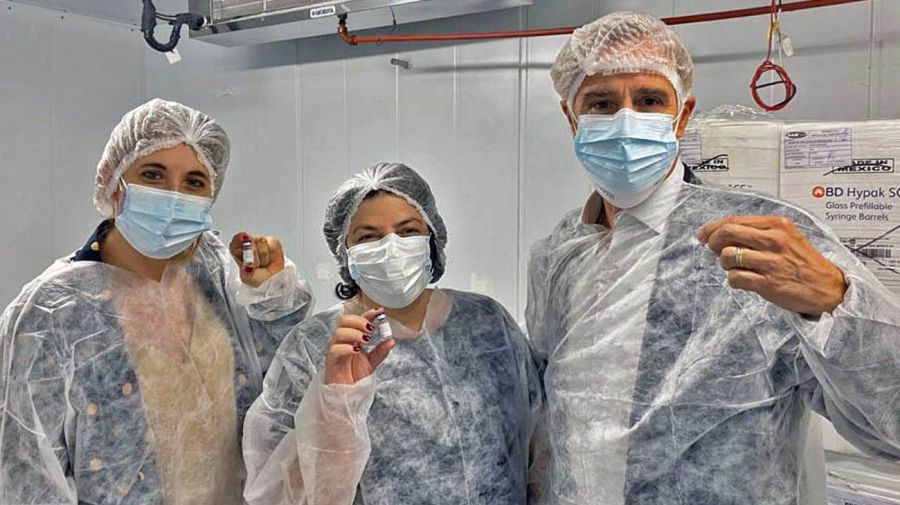
– JULY –
W26. The second half of the year starts with the newly “standalone” country nationalising the Hidrovía Paraná-Paraguay waterway in the name of “hydric sovereignty” – the outlet for around 81 percent of Argentine foreign trade (including 96 percent of container traffic) with land transport in the iron grip of the teamsters. Neither the four other countries through which the river flows nor the seven provinces with banks on the waterway, all of whom share the sovereignty, are consulted. The state is accused by some figures of seeking to grab the annual US$300 million in highway tolls for electoral slush funds rather than the investments urgently needed to dredge an increasingly dry river (less than a metre deep near Rosario). Arguments of the need to curb contraband are spurious because the Coast Guard and Customs exist for that purpose. And if the state is sincere as to a temporary 12-month takeover, could there be a hidden agenda of passing the waterway to Shanghai Dredging? The second day of the month also sees an important change – as Covid-19 deaths top 95,000, and the first two cases of the dreaded Delta vaccine appear, President Fernández signs a decree amending the vaccine law to meet the requirements of US labs like Pfizer, Moderna and Johnson & Johnson, thus ending several months of stonewalling Western vaccines with the second wave of coronavirus leaving little choice (health workers strained to the utmost are threatening strike action). From the start of the month entries into Ezeiza Airport are capped at a daily 600 with dozens of flights cancelled, leaving up to 45,000 people stranded abroad by the end of the week – Kicillof sentences those returning from abroad to four days’ hotel quarantine at their own expense. The week ends with insistent reports Patricia Bullrich was relinquishing the top City Congress candidacy for Juntos por el Cambio in favour of former Buenos Aires Province governor María Eugenia Vidal but if opposition leadership is slowly falling into place, they are still lacking a platform as a complex coalition strategically divided between offering real change and playing for the middle ground.
W27. The week of Independence Day is anything but celebratory with the pandemic demoralising the population at large and exhausting health workers while farmers choose the national day to protest (with Patricia Bullrich dressed as a gaucho at the biggest protest in San Nicolás). Reporting intensive care bed occupancy halved since last month, City Hall permits social meetings of up to 20 people and outdoor events of up to 1,000 while employees can return to commuting to work up to 30 percent of office capacity. The “blue” dollar moves up to 174 pesos in the second week of the month from 170 pesos in the first. A fractious Mercosur makes its midyear switch of bloc presidency from Argentina to Brazil with President Fernández accusing his colleagues of going it alone and being criticised in turn. Senator Carlos Reutemann, a former two-term Santa Fe governor who began his career in Grand Prix motor racing, dies at the end of his fourth term at the age of 79, the third ex-governor of that province to expire in little more than a year following Hermes Binner and Lifschitz.
W28. The Covid-19 death toll enters six digits as the government decrees five days of national mourning for the over 100,000 lives lost (but without a word of apology for its own mistakes contributing to that tragedy). Argentina with just over 0.5 percent of global population thus has some 2.5 percent of the world’s known dead, surpassing the entire population of four provincial capitals. The situation is slowly improving (it took twice as long to reach 100,000 from 90,000 as the latter figure from 80,000 while intensive care bed occupancy is down by more than a third since mid-June) with the daily airport entry cap raised from 600 to 1,000 passengers – a contract with Moderna is hastily signed the previous weekend and within four days a US donation of 3.5 million doses is flown in from Memphis. Yet for Cristina Fernández de Kirchner at least, her judicial trials and tribulations are the biggest problem and on the eve of the 27th anniversary of the 1994 bomb destruction of the AMIA Jewish community centre, she explosively demands that the trial of her Memorandum of Understanding with Iran charging her with covering up the suspected Iranian masterminds of that terrorist atrocity be quashed, calling it “a judicial and political scandal” and persecution initiated by the previous Macri government. But in the same week Macri (stranded abroad in Switzerland) is also the target of court scrutiny when prosecutor Claudio Naval Rial opens an investigation into allegations that in his last month in office the centre-right president sent munitions to Bolivia at the time of the collapse of the leftist Evo Morales government, charges aired by the new Justice Minister Soria and Security Minister Sabina Frederic. Midweek sees the deadline for electoral alliances close with the main novelty being the expansion of Juntos por el Cambio with such new recruits as 2015 progressive presidential candidate Margarita Stolbizer and liberal ex-minister Ricardo López Murphy while there is much excitement about Manes heading a Radical list entering a competitive Buenos Aires Province primary against Deputy City Mayor Diego Santilli for PRO – without too much idea of what Manes actually stands for. Juntos por el Cambio reach agreement on a single list in 20 of the 23 provinces and Frente de Todos in 18. INDEC reports a June inflation of 3.2 percent, down on the previous figure for the fourth straight month (if only fractionally) but also placing the 2021 Budget forecast of 29 percent even further out of reach. All pensioners below twice the minimum retirement benefit (or around 85 percent of them) are to pick up a 5,000-peso bonus next month. After 15 years of ownership Francisco de Narváez sells El Cronista Comercial newspaper to a group headed by ex-minister José Luis Manzano. A tragic week begins on a bright note with Argentina winning the Copa América by beating hosts and favourites Brazil 1-0, its first international title since 1993. Last and undoubtedly least at the time, First Lady Fabiola Yánez celebrates her 40th birthday in midweek without anybody taking notice.
W29. The vaccination campaign picks up with over half the population now inoculated with at least one dose as the Tokyo Olympics start at the end of the week with former judo gold medallist Paula Pareto one of the Olympic flag-bearers, distracting many people for the next fortnight. The candidacies for the September 12 PASO primaries close that same weekend. At first glance this battleground looks like a direct clash between two polarised and highly centralised camps (City Mayor Rodríguez Larreta seems to be calling all the shots in the opposition while Frente de Todos strategy seems wholly geared to Greater Buenos Aires) but public opinion surveys point to the electorate being divided into four quarters – one quarter extremely identified with one half or other of the grieta rift, one quarter more tenuously linked, one quarter in the middle and the remaining quarter utterly disgusted with politics. Lockdown eases further with a continuing deceleration in pandemic data – City Hall announces a complete return to classroom education after the winter holidays while the maximum numbers permitted for indoor and outdoor activities of all kinds are raised. Nevertheless, the leak of a letter by presidential advisor Cecilia Nicolini to Russian authorities complaining about Sputnik V vaccine delays creates a considerable stir while a survey shows at least two million Argentines to have dropped out of the middle class during the coronavirus pandemic, turning a pre-Covid majority into a minority. The “blue” dollar soars to 185 pesos, its highest level since 195 pesos nine months ago. A very different story to the austral currency created in 1985 by then Economy Minister Juan Sourrouille (1940-2021), who dies in midweek – at its birth just 80 cents of an austral could buy a whole greenback. Boudou is granted parole.
W30. This quiet winter holiday week gives birth to an improbable electoral game-changer – the first lady’s 40th birthday only a fortnight previously continues to be uncontroversial but her 39th the previous year is quite another story as the social networks buzz with images of partying into the small hours at Olivos presidential residence at the peak of the strictest quarantine. The second wave of the pandemic continues to recede but the Covid-19 weekly death toll is still over 2,000 while dozens of cases of the Delta variant and hundreds isolated as a result make people nervous. Health Minister Vizzotti crowns a U-turn in vaccine policy in this week when she announces the purchase of 20 million doses of Pfizer vaccine, which also serves the useful electoral purpose of presenting a more moderate ideological image. Buenos Aires Province now joins City Hall in confirming classroom education after the winter holidays. Fuller details of the electoral candidates registered by the deadline the previous weekend emerge during the week – perhaps the most significant of these is that the number of exits from the original Frente de Todos Cabinet now reaches six as Ministers Daniel Arroyo (Social Development) and Agustín Rossi (Defence) trade in their portfolios for candidacies, the former for a lowly 12th slot under Victoria Tolosa Paz in Buenos Aires Province and the latter for a Santa Fe senatorial run. Arroyo is quickly replaced by Hurlingham Mayor Juan Zabaleta, 54, but the Defence portfolio remains vacant for a while. Entry into the final stages of the midterms timetable with the definition of electoral alliances and candidacies during this month is leading to an accelerating departure from the relative fiscal orthodoxy of the first half of 2021 – the Central Bank prints around a quarter of a trillion pesos in this month alone as Paris Club payments make a dent in reserves while Guzmán has replaced the zero credit abroad of “standalone” Argentina with what looks dangerously like a Ponzi scheme of refinancing peso bonds at escalating interest rates. Right at the end of the month the singer Chano is shot by an inexperienced police officer who insisted that he was protecting the mother of a drug addict from the attacks of her deranged son but the episode was filed in some circles as yet another example of trigger-happy policing. The Rugby Sevens team wins a bronze medal in Tokyo.
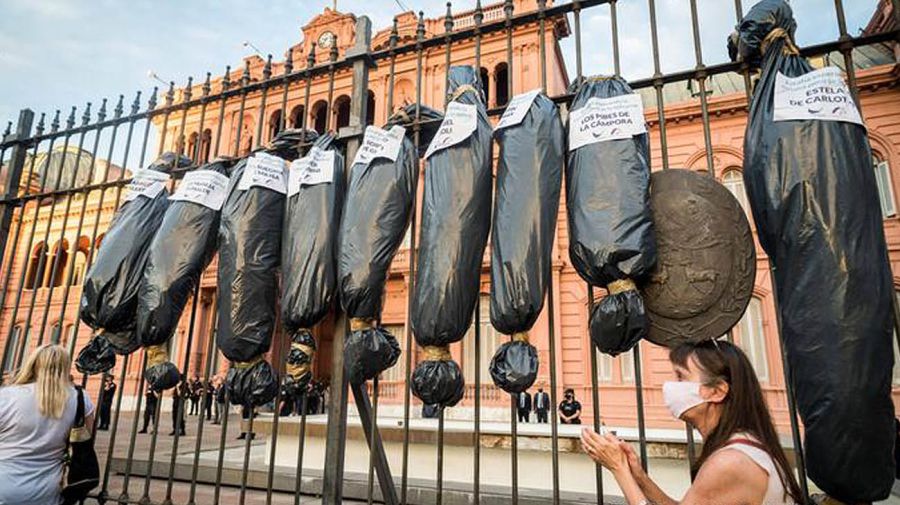
– AUGUST –
W31. For many people the week’s big story is Lionel Messi’s 20 years in Barcelona coming to an end. Coronavirus infections hit five million in this week but the pandemic is clearly on the wane for now, so much so that President Fernández starts forecasting seven percent growth for this year as restrictions are relaxed (such as raising the daily airport entry cap from 1,000 to 1,700) while schoolchildren nationwide (except for Formosa and Santa Cruz) resume classroom education in some form. But increasing talk elsewhere in the world on the need for a third booster jab could raise the vaccine bar. Moreover, the government’s electioneering insistence on identifying the vaccination campaign with the ruling coalition could breed resistance, along the lines of many US Republicans. Federal prosecutor Ramiro González agrees to investigate last year’s birthday partying in Olivos presidential residence. Child poverty is estimated at 63 percent by an NGO. US President Biden nominates lawyer Marc Stanley as Washington’s future ambassador here while his National Security Advisor Jake Sullivan pays an amicable visit here.
W32. The scandal over the previous year’s birthday party reaches its crescendo with the opposition contemplating impeachment of the President amid the general public indignation. A replacement for Rossi is finally found with Senator Jorge Taiana moving into the Defence Ministry. The top Frente de Todos Congress candidate in Buenos Aires Province, Victoria Tolosa Paz, gratuitously proclaims heavier taxation for big business (whose tax burden has already doubled in this century) in a Robin Hood spirit of robbing the rich to help the poor – as supposedly a voice of the coalition’s moderate presidential wing (with the firebrand Fernanda Vallejos dropped from her list), this casts doubts on whether Kirchnerism is pursuing its usual strategy of presenting a moderate image in campaign to do the opposite once in office (with the 2019 Fernández-Fernández ticket where the vice-presidential tail subsequently wagged the presidential dog as the latest example). Tolosa Paz then presents the extraordinary thesis that if investment fell off despite Macri’s tax cuts (as it did indeed in accurate anticipation of what was to come), it would surely rise with heavier taxation. Following the walkout of deputy Facundo Moyano (who heads the highway tolls employees’ union) from the Frente de Todos caucus, Public Works Minister Gabriel Katopodis announces the virtual nationalisation of City access routes via scrapping their 2018 contracts. President Fernández announces that Internet will be made a public service, forgetting a decree to that effect from the previous August. On the pandemic front thousands begin combining first doses of Sputnik V vaccine with second of Moderna or AstraZeneca while City Hall completes the return to classroom education. July’s inflation weighs in at exactly three percent with annual inflation already overtaking the 2021 forecast of 29 percent with five months still to go. Pensions are increased 12.39 percent for the electorally crucial third quarter while electricity billing is hiked 16-19 percent for just 11,500 mainly industrial users. The “blue” dollar ends its retreat of the month’s first fortnight to close the week at 182 pesos. Saint Cajetan’s Day bears witness to massive social discontent. Messi signs for Paris Saint-Germain as Messi-mania grips the French capital.
W33. The return of the Talibans in Afghanistan tends to overshadow local news even here. The Covid-19 death toll reaches 110,000 as thousands of stones bearing the names of the dead are deposited outside Government House and Olivos presidential residence in silent reproach of the first lady’s birthday party at the latter (with her pregnancy already rumoured). Continuing negative feedback from that party makes the opposition fears of “seven deputies away from Venezuela” seem even more exaggerated (which they are in any case since the Cristina Fernández de Kirchner presidency could not “democratise” justice even with overall Congress majorities). On the contrary, the chances mount of the veep distancing herself from a defeated government, leaving its presidential wing and the opposition holding the baby of austerity and then bouncing back with the backlash. While the government is not necessarily doomed to midterm defeat in a vapid campaign, the damage to presidential credibility is irreversible. Both sides face an uphill battle in key Buenos Aires Province with the bar raised for a unified Peronism while the opposition’s 2017 success (defeating Cristina Kirchner in her stronghold) is a hard act to follow. Picket protests throughout the week with a monthly 67,576 pesos needed for a household to remain above the poverty line according to INDEC. Salta’s provincial elections go the local government’s way like all voting at that level until now with single digits for Frente de Todos. Carpincho rodents overrun Nordelta.
W34. President Fernández enters into some tepid self-criticism over the ‘Olivosgate’ scandal, offering to donate part of his salary in exchange for curtailing any legal action over quarantine violation (which does not prevent prosecutor González from formally charging him), and advances the dubious argument that violation is not an offence if there is no contagion (which is like saying that drunken driving is harmless if there is no accident) – at least one co-defendant argues that the quarantine was unconstitutional in the first place. There is a further presidential gaffe right at the close of the month when he says: “I will not betray Cristina nor Máximo nor Massa nor the people who voted for me” (quite apart from placing the people at the bottom of that list, why would he even need to say it if not in his mind?). A video of a La Matanza history teacher yelling harangues against the Macri government to her class rapidly becomes a trending topic on social networks – the teacher, suspended by the local authorities, is criticised by almost everybody but at least has a presidential defender, who comments: “It’s formidable that there’s been this debate.” The arrival of US$4.334 billion in IMF special drawing rights, lifting Central Bank reserves to US$46.3 billion (their highest level in three years) and projections of the year’s growth rising to eight percent find the government more bullish about a shattered economy. In campaign debates Frente de Todos candidates lay Macri’s IMF mega-debt at the opposition’s door while their Juntos rivals point to the massive deficits of Kirchnerite governments past and present, as well as an accelerating quasi-fiscal deficit – six of one and half a dozen of the other, one might think. Covid-19 cases are now 85 percent down from their May peak while the return of football is announced although the week also sees the first death from the Delta variant. A Corrientes Peronist provincial deputy is shot in the stomach at an election-eve rally in an incident which seems more important at the time than it turns out to be (not as bad as 90 candidates being shot dead ahead of Mexico’s June midterms) – the voting there three days later sees Radical Governor Gustavo Valdés re-elected by a landslide with over three-quarters of the vote, which should have sent alarm-bells ringing amid the ruling coalition. During the same weekend Security Minister Frederic tactlessly downplays widespread crime concerns by saying that “Switzerland is calmer but more boring” while a diplomatic spat begins across the Andes as Chile’s extension of its continental platform overlaps with Argentina’s South Atlantic claims. The following Monday Kicillof finally reaches agreement with bondholders over restructuring US$7.1 billion although more on the basis of exhausting creditor patience than restoring provincial credit.

– SEPTEMBER –
W35. The month starts with the death of the notoriously supine ex-judge Norberto Oyarbide (70) of Covid-19 after two months in intensive care. With most opinion polls slightly in their favour, the Frente de Todos government is moderately optimistic about the midterms despite the pandemic, economic malaise and a series of unforced errors. A united Juntos opposition is nevertheless tactically divided between those aiming for middle ground consensus to win votes and those urging real changes (under pressure from the libertarian upsurge). The government extends both its beef export cap into this month and next, as well as its ‘Previaje’ plan (refunding half the cost of any tourist package within Argentina between November and next February) into mid-September. The IMF requests from Argentina a “credible and solid” macro-economic plan as a platform for negotiations.
W36. The final week in the run-up to the PASO primaries, which come the day after the 20th anniversary of 9/11 (the Twin Towers attack). Some of the advance hype makes the PASO seem as apocalyptic as 9/11 with the wrong result sure to plunge the country into chaos or tyranny but it is merely the prelude to renewing half the deputies and a third of the senators for the midterms while weeding out all lists falling below a 1.5 percent threshold. Nor is it a plebiscite on the Alberto Fernández presidency (nor on Macri, as some government voices would like to think, neither man is a candidate) and nor does it define the choice of his successor in any way. The closing rallies are duly held, appealing to the undecided and the youth vote but offering little to attract either in a campaign devoid of serious platforms and debate throughout. Pollsters generally trend towards a close and polarised race with a low turnout and nobody reaching 40 percent although scenarios of a substantial government advantage and a crushing opposition victory are also forecast. Amid the distraction of the campaign climax, AFIP tax bureau drops all charges against Kirchnerite businessmen Cristóbal López and Fabián De Sousa for tax evasion to the tune of eight billion pesos by their firm Oil Combustibles on the grounds that they were the victims of “political persecution” by the Macri administration. Football with spectators returns just in time for the primaries (three days beforehand) with the perfect result – Argentina beating Bolivia 3-0 with a Messi hat-trick. The “blue” dollar, moving in a range of 182-187 pesos in the final pre-PASO week, is not especially volatile. Little news on the pandemic front in an intensely political week apart from the government defining its ‘Mi Argentina’ digital vaccination credential as a health passport for use abroad.
W37. An unexpectedly heavy PASO primary defeat (the second in a row for a sitting government after the “game over” vote against Macri in 2019) plunges the ruling coalition into crisis with a raft of ministerial resignations in midweek and a drastic Cabinet reshuffle (strangely excluding the resigning officials) in the week’s closing minutes. Frente de Todos garner less than 31 percent of the vote nationwide, winning in only six of the 23 provinces (not including either their Buenos Aires Province stronghold or the Santa Cruz birthplace of Kirchnerism) and in only two of the eight electing senators while Juntos pick up 40 percent of the vote nationwide with a margin of almost five percent in Buenos Aires Province. These figures add up to 70 percent voting against the government and for the two main coalitions alike, less polarised than ever. The heavy anti-government swing thus confounds the general expectations of a close contest. A quarter of the Cabinet responding to Vice-President Cristina Kirchner and spearheaded by Interior Minister Eduardo ‘Wado’ de Pedro present their resignations in midweek to enforce a shuffle with the veep upping the pressure the next day by penning an aggressive letter (backed by an even fierier WhatsApp from outgoing deputy Fernanda Vallejos). President Fernández could actually do with a coalition reshuffle more than a Cabinet reshuffle and for a day or two he seems to waver towards accepting those resignations and soldiering on with a moderate minority government for the next 27 months but finally yields to pressure. As early as three days after the primaries “plan platita” talk of throwing electoral goodies at the voters is already being openly aired. The defeat is so crushing that it prompts questions as to whether it is the end of Peronism or at least Kirchnerism – the jury remains out but a vicious circle of constant mutual reinforcement between an ever poorer country and populist government seems to have been broken with votes as low as 23 percent for Frente de Todos in some slum neighbourhoods (social protests escalate in the latter half of the week). While Kirchnerism has been losing midterms since 2009, this is the first time since 1983 that a united Peronism has not proved invincible. Meanwhile among that half of the country above the poverty line, the 13.6 percent won in this city by strident libertarian Javier Milei is the tip of the iceberg for an alienated middle class and a youth yearning to emigrate. Unfortunately for Guzmán, September 15 is the statutory date for submission of the 2022 Budget, which he has to submit while under intense pressure to resign. For what it is worth, this budget posits 33 percent inflation, four percent growth (with real wage growth of over five percent) and a primary fiscal deficit of 3.3 percent of Gross Domestic Product which will be financed by public private bonds and printing over a trillion pesos – it is assumed that no capital repayments on debt will be made. The “blue” dollar closes the week at the 185 pesos of the previous Friday. The pandemic is starting to become a secondary problem with just over 1,000 deaths in the week and restrictions continue to be relaxed – outdoor events up to 4,000 people and indoor up to 70 percent of capacity are now permitted. López and De Sousa agree to pay off their tax arrears (which have now risen from eight billion to 12.7 billion pesos) in 97 quotas after being let off the hook by AFIP.
W38. The revamped Cabinet emerges during the first weekend after the PASO primaries with a change of Cabinet chief as well as some ministers – Tucumán Governor Juan Luis Manzur (who needs a couple of days to ensure that his home base is covered) becomes Cabinet chief instead of Santiago Cafiero who in turn displaces Foreign Minister Felipe Solá (who boards his flight to a regional summit as minister and lands in Mexico as an ex-minister). The controversial Aníbal Fernández (who promptly calls Civic Coalition leader Elisa Carrió a “dirty lady” for saying that he knows all the mafias as one of them) replaces Frederic as Security minister. Three other ministers are bounced – Nicolás Trotta (Education), Luis Basterra (Agriculture) and Roberto Salvarezza (Science), respectively replaced by Jaime Perczyk, Julián Domínguez and Daniel Filmus – thus leaving President Fernández with less than half of his original Cabinet. All six of the new faces are male despite the firm presidential commitment to gender equality. These changes bring traditional or territorial Peronists into the government far more than Kirchnerites, who would perhaps rather dodge the blame for a likely midterm defeat and its aftermath – this trend is especially clear in Buenos Aires Province where Lomas de Zamora Mayor Martín Insaurralde replaces Kicillof’s pal Carlos Bianco as Cabinet chief. Apart from these changes, some electioneering follows in the week such as upping the income tax floor from 150,000 to 175,000 pesos and the minimum wage beyond 30,000 pesos (monthly figures) but perhaps the main feelgood factor is to move abruptly from being talibans of quarantine to the world’s first post-pandemic country in recognition of the libertarian attitudes now in electoral vogue. Spring Day is optimistically proclaimed “the last day of the pandemic” by Health Minister Vizzotti and Manzur (himself a former Health minister). For its part the opposition sets a 45 percent target for midterm voting. Horacio Rosatti is voted the next Supreme Court chief justice as from October in a vote boycotted by justices Ricardo Lorenzetti and outgoing Elena Highton de Nolasco. The presidential pregnancy is finally confirmed with the first lady reported to be 10 weeks pregnant. Kirsty Hayes, 43, presents her credentials as the new British ambassador replacing the popular Mark Kent with the COP26 climate change summit in Glasgow (close to her birthplace) her immediate priority.
W39. Two Argentines out of every five remain below the poverty line with destitution on the rise (to 10.7 percent) despite the economic rebound from the relaxation of lockdown, INDEC reports on the last day of the month. There is a slight improvement from 42 percent in the second half of 2020 to 40.6 percent in the first half of the year but disappointingly low given the extreme contrast with the meltdown of the previous year. Given the number of jobs recovered, more employed people than ever are below the poverty line with over 70 percent earning less than the average wage. A poverty which long guaranteed captive votes come election time no longer seems to work that way a fortnight away from the midterms as the various plans become rapidly worthless from the money printed to pay them – the poor might even reason that if the government squeezes pensions and phases out pandemic assistance while on top in the first half of the year and now runs up electoral handouts to the tune of 150 billion pesos after their primary defeat, it might even make sense to vote against them. The political dividends of poverty are no longer there yet the government still trusts in “putting money into pockets” to turn the PASO results around (as happened in San Luis in 2017), as well as entrusting the campaign to territorial party bosses. Government efforts to salvage the midterms risk making victory in the far more important 2023 general elections a mission impossible. On a constantly improving pandemic front, 1.3 million Sputnik vaccines have to be returned to Russia for labelling irregularities while minister Vizzotti has a new health crisis (this time acute appendicitis). The new Security Minister Fernández sends 575 Border Guards to Rosario and creates a new 1,000-strong flying squad to counter rampant crime there. President Fernández addresses yet another United Nations Zoom Summit, this time on job creation and social protection, but the subject is irrelevant since his song is always the same – the need for “a new international financial architecture” to ease Argentina’s debt conditions. Former Environment secretary Romina Picolotti is convicted with a suspended prison sentence for fraud (which apparently took the form of letting her family run away with her expense account). The American Club falls victim to the pandemic as the month closes.
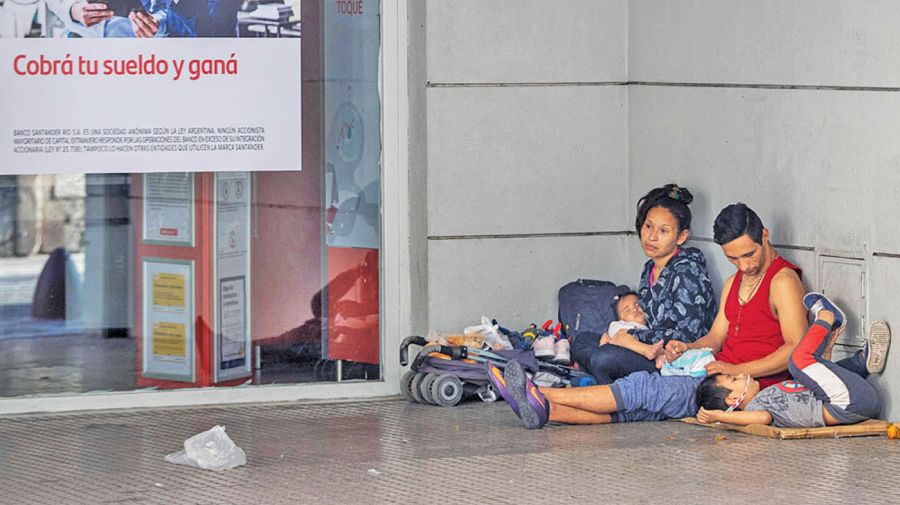
– OCTOBER –
W40. The month starts with the government approving Sinopharm vaccination for children in the 3 to 11 age-group while the government adds the significant exception of China to its beef export cap, thus effectively freeing 89 percent of sales abroad. Fernández de Kirchner is acquitted in the case involving the 2013 Memorandum of Understanding with Iran – a verdict fiercely criticised by the opposition but also based on the sound legal principle of courts not sitting in judgement on the policies of elected governments, no matter how bad. It is also refreshing to see judges not running behind electoral trends, given that the ruling comes less than a month after the PASO primary’s massive repudiation of the veep (who should not consider herself acquitted in that arena). Elsewhere on the judicial front, Highton de Nolasco makes this month her last in the Supreme Court while Macri’s absence in the United States renders inoperable what looks like a politically driven summons to testify in a Dolores court on the illegal espionage into the families of the lost submarine ARA San Juan. Meanwhile the chances of federal judge Daniel Rafecas becoming attorney-general improve since the dim electoral prospects of a continued Frente de Todos Senate majority seem to doom dreams of a more Kirchnerite chief of prosecutors. In this week Argentina reaches complete vaccination for half its population, which immediately triggers the announcement that all airport entry caps will be lifted on October 19. Abroad the Pandora Papers open up a can of worms exposing the secrets of offshore millions in tax havens although no top-level local names emerge – Macri’s two brothers, Néstor Kirchner’s late secretary Daniel Muñoz and various figures from the football world are among the most important. Chasing the youth vote, President Fernández invites the popular trapero singer and recent father L-Gante to Olivos presidential residence.
W41. The 57th IDEA Colloquium in the latter half of the week only seems to underline a general lack of any new ideas as to how Argentine digs its way out of its hole. Least of all the price controls revived by the new Domestic Trade Secretary Roberto Feletti, who hits the ground running after replacing Paula Español the previous weekend – in midweek he announces a price freeze on 1,247 items “of first need” (not excluding champagne) until the second week of 2022 while the next day INDEC confirms inflation to be on the rise with a September figure of 3.5 percent. Four millennia of human history since Babylonian price controls argue against Feletti’s chances of success, which would also contain the seeds of failure since products maintaining a frozen price simply vanish from supermarket shelves while manufacturers refrain from making their main investments in products carrying the lowest price. But perhaps the objective does not extend beyond steadying prices for the next month until the midterms. Speaking at IDEA, President Fernández warns business leaders over “incomprehensible” price rises while tighter regulations are introduced for maize exports without direct restriction. Entrusted with the task of stopping criminals, Security Minister Fernández picks a fight with the La Nación cartoonist Nik, whose target had been Kicillof, not the minister. City Congress candidates clash in debate with some sparks flying but without producing anything in the way of a game-changer. Following L-Gante’s Olivos visit, the government increasingly gears its campaign to youth with the latest bid to buy votes taking the form of granting a culture bonus of 5,000 pesos to the jobless in the 18-24 age-group to go to cinemas, concerts, theatres, etc., also with the idea of aiding that pandemic-stricken sector.
W42. Pre-election jitters begin to set in – the “blue” dollar, which had been remarkably stable at around 185 pesos for more than a month since the PASO primaries, shoots up to 195 pesos while country risk closes the week at 1,671 points as against 1,629 the previous Friday. Peronist Loyalty Day right at the start of the week fails to gather a nominally united Peronism in one place – on the day itself ultra-Kirchnerites roundly criticise President Fernández for negotiating with the IMF and local businessmen as some marchers trample on the stones honouring the coronavirus dead while the next day the CGT stages a far soberer event. Massa’s take on the occasion is to argue that, win or lose the election, a pact with the opposition or even power-sharing will be inevitable in a revival of the constant but invariably vague yearning for consensus. But meanwhile the ruling coalition is more fractious than ever – under a devalued presidency the original troika of the presidential duo and Massa has been joined by newer pockets of power such as the new Cabinet Chief Manzur (already somewhat on the wane), Feletti and even the even newer presidential spokesperson Gabriela Cerruti. These divisions make an opposition far clearer about what it does not want than what it does wary of any pacts, quite apart from fears of being trapped into sharing the blame for an unpopular austerity. An arson attack in Patagonia by the RAM militant Mapuche grouping coincides with the Argentine Ambassador to Santiago, Rafael Bielsa, intervening in a parole hearing for the convicted RAM leader Facundo Jones Huala in Chile –the two Fernández (president and minister) send mixed messages as to the intervention of national security forces as the government struggles to maintain a politically correct stance enjoying scant electoral empathy. Macri ignores his second Dolores court summons while challenging the impartiality of the judge with government supporters calling for his arrest for contempt of court and with even his Radical ally Manes critical. Against all the odds rock legend Charly García turns 70 while in lighter news the yellow press and the social networks have a field day with the saga of Paris Saint-Germain (occasional) striker Mauro Icardi and his wife Wanda Nara, eclipsing even Messi’s baby steps there.
W43. President Fernández ends the week crossing the Atlantic to attend the G-20 summit in Rome and COP26 in Glasgow with a packed but single-issue agenda, given his monothematic obsession with debt relief (even if the global Covid-19 death toll reaches five million on the eve of the Rome summit although barely into three digits in Argentina that week). In Glasgow the president talks the talk about reducing carbon emissions but back home his government’s enthusiasm for Vaca Muerta fracking has led to a Frente de Todos bill stunting biofuels while the extreme subsidies of gas and electricity billing across the social spectrum, more electorally driven than ever, invite energy guzzling (also drawing the interest of Bitcoin mining, whose intense computer programming against fraud require energy consumption on the scale of entire countries as big as Argentina). Macri finally shows up to testify in Dolores, accompanied by a throng of supporters (uncomfortably resembling similar turnouts at Fernández de Kirchner’s trial appearances) and a scrum of reporters, but nothing happens because the judge has forgotten to request that he be relieved of his institutional obligation to respect intelligence secrecy (an oversight quickly corrected by presidential decree just before heading for Europe). Election campaigning centres on two anniversaries – the 11th of Néstor Kirchner’s 2010 census day death for government supporters and the 38th of Raúl Alfonsín’s 1983 landslide election victory for the opposition, especially Radicals (mindful of their significant contribution to the PASO primary triumph, not least Manes towards the Buenos Aires provincial upset). The relaxation of pandemic restrictions is now proceeding as far as lifting the limits on rush hour transport seating while the government offers free vaccination to incoming tourists, as well as allowing them to change up to US$5,000 at the parallel MEP, not the official rate. Prospective US ambassador Stanley criticises the government for its lack of a plan to preface IMF negotiations and its passive approach to human rights abuses in Venezuela, Cuba and Nicaragua, as well as expressing apprehension about the penetration of Chinese 5G technology. Congress approves a bill obliging the food industry to label health warnings on products with excessive sugar, fat and sodium content.
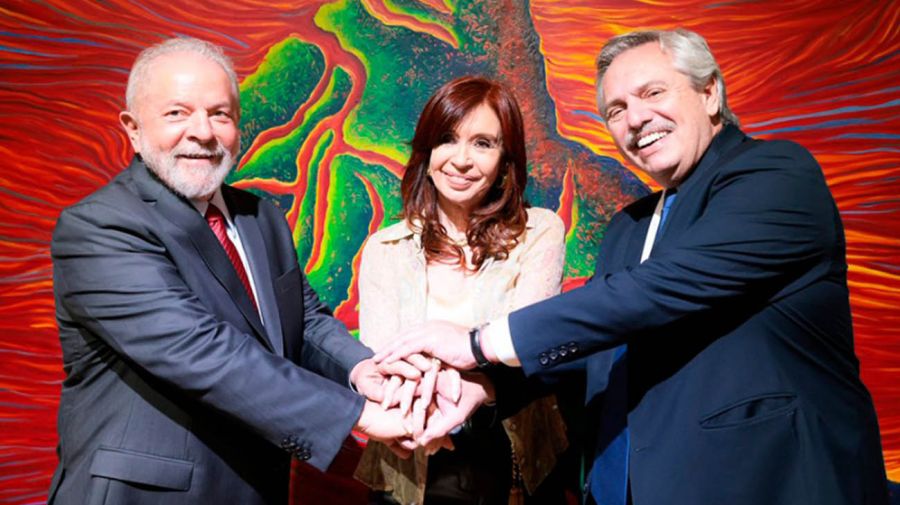
– NOVEMBER-
W44. President Fernández returns from Europe where he asked world leaders at both the Rome and Glasgow summits for “greater flexibility” in restructuring IMF debt, even if his own fragmented coalition back home has no single voice on this problem – such global issues as climate change (big in Rome as well as Glasgow) and the pandemic are mostly ignored by a needlessly large 100-plus Argentine delegation, apart from announcement of a future green hydrogen plant in Río Negro with an Australian investment of US$8 billion. A country not even among the world’s top 30 economies should not take G20 membership for granted but put more on the table. The Frente de Todos administration remains off track the following weekend when it fails to question the democratic credentials of a Nicaraguan election clinched by President Daniel Ortega on the basis of jailing several rivals. The “blue” dollar closes the penultimate week before midterms on the brink of 200 pesos as money market volatility continues. Vice-President Cristina Fernández de Kirchner (an entirely passive acting president during the presidential absence) has a hysterectomy revealing a benign polyp with nobody expecting her sympathy vote of 2011 to be repeated – this conveniently exempts her from joining the marshals of defeat in mid-month. A prelude for a longer absence leaving President Fernández and the opposition to take the blame for the inevitable austerity? Prior to entering hospital, she joins her children Máximo and Florencia in requesting acquittal in the case of money-laundering via the family’s Hotesur Patagonian hotel chain. The month begins with Argentina opening its frontiers to tourists from all countries with complete vaccination and a negative PCR test. Booster vaccinations of risk groups aged over 50 commence. Feletti summons the lab chambers to extend his price freeze to medical drugs. Macri returns to Dolores where he refuses to testify verbally but presents a written statement denying any participation in illegal espionage – his entrance into the courtroom includes jostling with a C5N reporter.
W45. Argentina reaches the midterm elections with September’s 3.5 percent inflation repeated for October, as confirmed by INDEC just three days before voting, despite Feletti’s frantic efforts (not to mention frozen utility billing and transport fares, a repressed exchange rate and extreme capital controls) while election eve also finds the “blue” dollar at the iconic level of 200 pesos (even if below the 207 pesos of the day before. Meanwhile a murder in Ramos Mejía (La Matanza) the previous weekend places crime high on the agenda, igniting the security issue like no other crime (and there were others) while philosophical comments by government officials that crime is worldwide (Security Minister Fernández) or that the problem goes a long way back (Kicillof) only add fuel to the flames. A crime in the heart of the Peronist stronghold of La Matanza in the last week before voting is also an invitation for opposition and media hype. The closing rallies before the midterms are no more inspiring than before the PASO primary, especially with a convalescent Fernández de Kirchner staying mum – (but still the most loudly applauded among Frente de Todos leaders) while Juntos themes were law and order and “setting a limit to Kirchnerism.” Steering clear of concrete percentages, the pundits mostly forecast a similar outcome to the PASO primary, despite the PASO lead being halved last time out in 2019 (a scenario which is to be repeated in Buenos Aires Province at least, if not nationwide). The CGT renews its leadership with the main novelty the return of the Moyano clan in the person of teamster leader Pablo. On the pandemic front City Hall starts giving a booster dose to those vaccinated over six months ago while booster doses are also announced nationwide for health workers and the 70-plus age group. Argentina makes its first vaccine donations to Vietnam, Mozambique and three Caribbean islands. The three chambers grouping labs agree to freeze the price of prescribed medicine until January 7.
W46. The Frente de Todos ruling coalition suffers a bruising defeat in the midterm elections, even if less crushing and less of a shock than the PASO primary. The impact is far more dramatic in the Senate where the opposition picks up seats from Frente de Todos in five of the eight provinces renewing their upper house representation (Chubut, Córdoba, Corrientes, La Pampa and Santa Fe), thus causing Peronism to lose quorum in the Senate for virtually the first time since 1983. The swing to the opposition is less clear-cut in the lower house with Juntos por el Cambio gains nationwide counterbalanced by the loss of seats in strongholds such as this city (three deputies) and Jujuy – each of the main coalitions end up with 15 of the 35 deputies up for election in pivotal Buenos Aires Province where the Juntos margin shrinks to 1.3 percent as Greater Buenos Aires mayors pull their fingers out. The latter improvement is stretched into defeat denialism by President Fernández in a defiantly celebratory mood at Wednesday’s mass Peronist Militancy Day rally in Plaza de Mayo, assuring the crowd that “triumph is not conquest but never giving up and nobody has beaten us.” Lending itself to easy mockery, this denialism grabs the headlines but the most telling part of his speech is insisting that the 2023 Peronist presidential candidate emerge from primary voting, thus implicitly dethroning Cristina Kirchner as a kingmaker. He also calls for a cooperation with the opposition, which is largely neutered by explicitly excluding both Macri and the libertarians. Fernández blames Macri and the pandemic for all problems but his own red ink in the form of both fiscal and quasi-fiscal deficits exceeds even the IMF mega-loan while a pandemic can be an opportunity as well as crisis, as his own 80-plus percent popularity ratings during its first weeks showed – as it was, school closure, a skewed vaccine policy and, above all, that Olivos birthday party shattering his credibility were all personal decisions contributing to his downfall. Crime, the imposition of a score of new taxes on an increasingly resistant citizenry, a foreign policy replete with double standards and various unforced errors can all be added to the list. Beyond the polarisation the most striking features of the voting are the emergence of a brand-new libertarian caucus with five seats while Frente de Izquierda double their strength from two to four seats. Virtually complete voting results have Juntos por el Cambio with almost 42 percent (9.73 million votes) and Frente de Todos with 33.5 percent (7.77 million votes), winning in only nine of the 23 provinces, with Frente de Izquierda a distant third with 5.9 percent (1.37 million votes) in a turnout of 71 percent. The future Congress will thus see Frente de Todos with 118 of the 257 lower house seats and 35 of the 72 senators, as against 116 and 31 respectively for Juntos, who also won in 14 of this city’s 15 communes. The balance of winners and losers seems to leave the opposition with too many presidential hopefuls for 2023 and the government with too few. Ultra-Kirchnerites headed by Boudou form the separate Sobernxs line the day after the election. If the spotlight was on Greater Buenos Aires with the Ramos Mejía crime before the midterms, it is City Hall’s turn to be in the hot seat for trigger-happy policing afterwards as teenager Lucas González is gunned down in Barracas by their police in midweek.
W47. For the second week running surprisingly little feedback from the government’s midterm defeat until the end of the week when the Central Bank’s “temporary” crackdown on credit spending abroad by banning quotas shakes up public opinion with both frustrated holidaymakers and the opposition extremely vocal in their criticism. The government insists that the move is necessary in order to shore up dwindling reserves long enough to reach an agreement with the IMF (which gives some on the left a sanctimonious excuse to declare their indignation even when their motive is also holiday plans in tatters). The move has far more effect on country risk than the “blue” dollar (which closes the week at the identical figure of the previous Friday, 201.50 pesos) – the tacit admission of fragile reserves intensifies fears as to whether the government has either the will or the legs to arrive at an IMF agreement, sending country risk up from 1,761 to 1,821 points as well as taking Argentina ever further away from the normal practises of a market economy. Up to then a procrastinating president has done little to make use of the window left by his veep’s silence – has he left it too late for anything serious or sustainable? The first round of Chile’s presidential elections replaces the previous dualism between centre-right and centre-left with an extreme polarisation between rightist José Antonio Kast and leftist Gabriel Boric (with the former a couple of points in front) – Ambassador to Chile Bielsa has no better idea than to blast Kast as “a disruptive follower of (late dictator Augusto) Pinochet,” as well as “anti-Argentine” and “xenophobic,” comparable to Brazil’s Jair Bolsonaro and Donald Trump in the United States. Santiago’s Foreign Ministry calls this “unacceptable interference,” especially when coming from a government priding itself on a foreign policy based on the “principle of non-interference.” Both Foreign Minister Cafiero and presidential spokesperson Cerruti downplay Bielsa’s comments as “a personal opinion” but that is precisely what it is not, coming from an ambassador. The opposition wastes no time in criticising Bielsa for crossing the diplomatic line, especially when coming a month after his controversial parole hearing intervention on behalf of Mapuche militant leader Jones Huala – again in the news this week after penning a letter from his Chilean prison calling for "blood to be avenged … and the bullets returned" in reference to the slaying of Mapuche youth Elías Garay in Cuesta del Ternero (south of Bariloche) the same weekend as the voting across the Andes. The letter is widely repudiated, including by Cerruti, but is also followed by the arrest of two suspected killers of Garay the following day. Until the credit card crackdown, the news generating the most buzz is a Molotov cocktail attack on Clarín head offices on Monday night by nine hooded assailants (with one arrest, reportedly a Uruguayan anarchist, four days later) – repudiated across the political spectrum although Fernández de Kirchner also mentions previous attacks on Frente de Todos offices. But for many people River Plate clinching the local football championship after a seven-year drought for the domestic trophy is the biggest news, the day before the anniversary of Diego Maradona’s death. On the pandemic front Vizzotti announces new restrictions right at the close of the week, including a health pass based on complete vaccination for all indoor activities while worldwide the Omicron variant makes its first appearance in global coronavirus terminology. Labour Minister Claudio Moroni assures that neither double severance nor the ban on dismissals will continue into 2022.
W48. The week is defined by a closing weekend of November very much starring the vice-president – nothing happening in the rest of the week carries the same importance with President Fernández disavowing any austerity in any future IMF agreement at the annual conference of the Argentine Industrial Union (UIA) being merely falling in line with his nominal subordinate’s weekend letter (with the top duo apparently incapable of having a simple chat). That letter reminds the president of his previous Independence Day words: “Never expect me to sign anything which ruins the life of the Argentine people, never, never” while giving him the green light to negotiate an IMF agreement – always subject to her review and maximising opposition responsibility for a debt incurred by their administration in the hope that cross-party endorsement of a harsh agreement will leave her inheriting all the backlash. Just before the weekend the Kirchner family along with other co-defendants are acquitted ahead of any trial in the Hotesur money-laundering case (probing the huge sums paid by the beneficiaries of public works contracts during the Kirchnerite presidencies into the presidential Patagonian hotel chain) – unlike the previous quashed trials against the veep (dollar futures, the memorandum of understanding with Iran), this cannot possibly be justified as a policy of an elected government exempt from court scrutiny. Public anger boils over the weekend with a petition drawing thousands of signatures and malfeasance lawsuits lodged against the judges – even accepting the defence argument that there is nothing technically illegal (a line also advanced to justify the Olivos birthday party and the ‘VIP vaccine’ scandal), the acquittal defies both common sense and basic ethics. If so primitively easy to obtain this favourable ruling within the traditional court system, the question remains why judicial reform was given such priority in the previous year of pandemic and economic collapse – an autistic priority contributing to the midterm setbacks of a fortnight ago. On the pandemic front incipient Omicron panic drives the government into ordering 10 days of compulsory quarantine for everybody flying in from the African continent (where it was first identified) or other affected areas. The gruesome killing of five-year old Lucio Dupuy at the hands of his mother and her new lesbian lover in La Pampa shocks and sickens the nation with police, court and medical authorities in the spotlight for negligence despite being alerted.
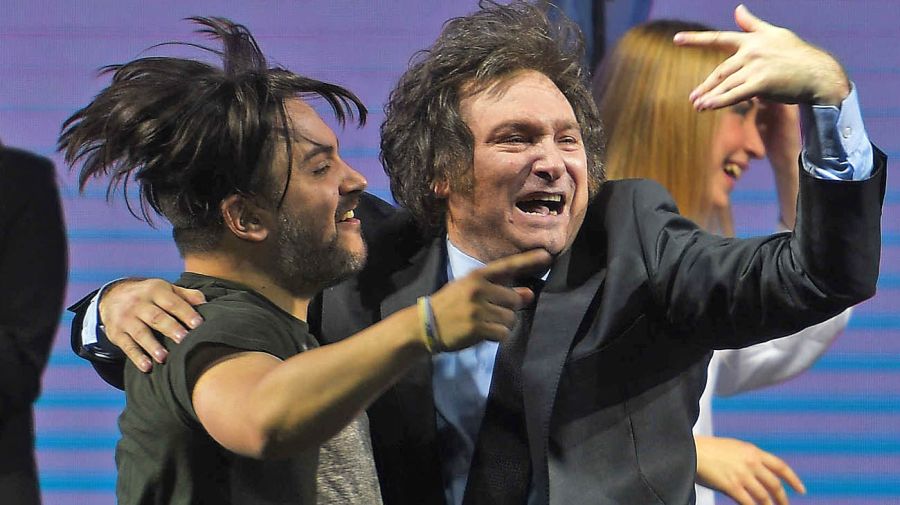
– DECEMBER –
W49. The month starts with ex-president Macri being placed on trial by Dolores surrogate federal judge Martín Bava for illegal espionage, specifically on the families of the crew of the submarine ARA San Juan (sunk in 2017) but also across an extremely broad front, without remanding him in custody. Other early news in the month includes the resignation of former Industry minister Débora Giorgi as Domestic Trade Secretary Feletti’s second-in-command (the result of tension with the nominal superior of both, Productive Development Minister Matías Kulfas, prompting President Fernández to withhold his signature from formalising her appointment seven weeks long) and Jorge Macri’s exit from the Vicente López mayoralty to become City Hall’s new government (interior) minister, reportedly his price for staying out of the midterms. Little enough happens in the first third of the month culminating in a huge rally in Plaza de Mayo to mark International Human Rights Day and the 38th anniversary of the return of democracy (and also the midpoint of the Alberto Fernández presidency although this is not highlighted) – the event is headed by not only the local presidential duo but also ex-presidents Lula and José Mujica of Brazil and Uruguay respectively. Yet even a full Plaza de Mayo of 70,000 people or more offers scant compensation for the five million votes lost in the previous month. The week sees the 127 deputies (Tuesday) and the 24 senators (Thursday) elected in those midterms to the new Congress swear in with an emotional farewell from Senator Esteban Bullrich, stricken with ALS (amyotrophic lateral sclerosis). Even ahead of that ceremony a dozen Radical deputies form their own splinter caucus UCR-Evolución responding to Senator Martín Lousteau while remaining within the Juntos por el Cambio coalition. Justice Minister Soría holds an extremely brash meeting with the Supreme Court, daring the justices to overrule the government’s judicial reforms should they clear Congress. Abroad, Argentine ambassador to Geneva Federico Villegas is chosen to head the United Nations Human Rights Council next year despite persistent Argentine abstention over Nicaragua and rejection of the international campaign to boycott the Winter Olympics in China to protest Beijing’s repression of minorities. Country risk plunges 140 points to 1,685 points, reflecting acceptance across the political spectrum (except the far left) of IMF negotiations as a fact of life. On the pandemic front Omicron make its “inevitable” arrival in the first weekend of the month, in San Luis, while further cases arise in Córdoba the following weekend – by then almost two-thirds of the Argentine population has been completely vaccinated. UCA Catholic University reports a similar percentage of Argentine children to be living in poverty.
W50. Against a backdrop of rising Omicron fears fed by escalating Covid-19 data, Congress rejection of the 2022 Budget in the week of its presentation is the big political story. The primordial task of parliaments throughout time historically empowering them, budget approval is also the first major item on the agenda of the new Congress with its adverse outcome an early warning sign about future governability (without even testing the waters in a Senate lacking a Peronist majority for almost the first time) – if the midterms only changed major coalition strengths by a couple of seats, the big difference now is made by the score or so deputies beyond those coalitions who now seem angrier with Alberto when previously more anti-Macri. Presented at the start of the week by Guzmán, the budget is also a non-starter for reasons other than Congress numbers, beginning with the rosy picture of a “double recovery” from pandemic and recession in his introduction – proclaiming an end to the pandemic amid the omnipresent Omicron panic looks like a total divorce from reality while forecasting 2021 double-digit growth might indeed transpire but is cancelled out by the collapse of similar dimensions the previous year. Given that Guzmán cannot tame the fiscal deficit without updating public service billing which would in turn send his 2022 inflation forecast of 33 percent through the roof, he thus has to choose between the three things (lower deficit and inflation, more realistic public service pricing) – he cannot have them all at once. All this without reference to the IMF agreement on which the confidence to keep multilateral credit flowing and the peso bond market going depends. As if all this were not enough, the 2022 budget is torpedoed far more by his own comrades than by verbal opposition criticisms as Frente de Todos deputies play Father Christmas piling in trillions of pesos of extra spending unaccompanied by any funding. As the week draws to a close, Congress turns down the 2022 Budget by a 132-121 vote – the 2021 Budget is renewed in its place (which actually gives the government a freer hand than the opposition would probably like). Another symptom of post-midterm shift occurs the previous day as the Supreme Court rules the 2006 reform of the Magistrates Council (drafted by Vice-President Fernández de Kirchner in her Senate days) unconstitutional, ordering the Council to return to the 20 members from the 13 of the previous 15 years since politicians had outnumbered representatives of the legal and judicial sectors in the streamlined version – Supreme Court Chief Justice Rosatti is to head the expanded body. Despite more immediate urgencies such as Omicron and the rocky road of the 2022 Budget (or perhaps as a distraction from them), President Fernández adds two new priorities to the agenda – a “federalist” change of capital and an “honest discussion” of the Supreme Court (in the wake of its ruling). At least inflation takes a breather with November’s 2.5 percent one of the year’s lowest figures although still leaving Feletti’s stabs at price freezes falling well short. The retirement of the prolific Sergio ‘Kun’ Agüero (aged 33) from professional football draws more attention than much of the above. The ensuing weekend is the 20th anniversary of the start of the 2001-20022 meltdown – successively the collapse of the Alliance government after riots and looting in the wake of the corralito clampdown on bank deposits, default on a 12-digit foreign debt and the end of convertibility, culminating in 2002 negative growth of minus 10.9 percent. Peronism continues to control that narrative – thus the corralito, which merely blocked access to dollar deposits without taking them away, is still almost universally blamed rather than the corralón of the Eduardo Duhalde government, which forcibly converted them into pesos at a highly unfavourable rate.
W51. The penultimate week of the year begins with all eyes on the other side of the Andes as leftist candidate Gabriel Boric secures a run-off victory over his Pinochet-loving rival, far-right politician José Antonio Kast, who concedes early and politely. Set to shake up not only Chile but the wider region (Chile's stock market plummeted the following day in response), Boric – a former student leader – describes himself as a moderate socialist who shuns the hard-left models of Cuba. Nevertheless, he faces enormous challenges including a divided Congress, stuttering growth and the writing of a new constitution. Meanwhile, the outgoing government, led by Sebastián Piñera, announces it will reopen its borders with Argentina. Speaking of leaders, back in Buenos Aires (Province not City this time), Máximo Kirchner formally assumes command of the region's branch of the Justicialist Party until December 2025. As Covid numbers begin to climb sharply, economic issues – mining specifically – takes a front seat with Lundin Mining Corp snapping up a copper and gold project in San Juan and the world's second-biggest miner, Rio Tinto Group, buying a lithium mine in Salta. Still on the same issue, attention turns south, where in Chubut Province (and the provincial capital of Rawson), days of protests take place in response to a new zoning law passed by the provincial legislature that paves the way for "mega-mining" in the region. Having perhaps underestimated the public backlash, Governor Mariano Arcioni announces the repeal of the law and that the issue will be put to a vote. INDEC announces an unemployment rate of 8.2 percent for the third quarter and that the economy grew 6.7 percent year-on-year in October, while the Economy Ministry announces a haul of more than 240 billion pesos from last year's wealth tax bill. Footballer Carlos Tevez loses his bid to avoid paying. There are celebrations in the capital though, as Barracas Central win promotion to Argentina's top flight and the memes about AFA chief 'Chiqui' Tapia and his 'help' flood the social networks (he is a former club president who even has the side's stadium named after him). Looking out, the government makes its latest payment to the IMF as the 2018 credit-line again hits the frontpages. The IMF's executive board issues a "ex-post evaluation" of the Mauricio Macri government's infamous agreement, concluding essentially that the programme "did not meet its objectives." The fall-out is immediately and unsurprisingly political, with government allies using it to beat the opposition leader and Macri's former minister, Nicolás Dujovne, coming out to defend the deal. Vitalik Buterin, the Canadian-Russian programmer best known as the co-founder of cryptocurrency Ethereum makes a seasonal visit to Buenos Aires to learn more about the country and its adoption of Web 3.0 and cryptocurrencies. Visiting shantytowns to city mayors, his pull is strong – after a couple of days he is drawing in the crowds to Usina del Arte to hear his views. All the while, throughout the week, Covid numbers have been surging, pushed higher by the Delta and more contagious Omicron strain. Soon the records are falling – highest daily tally in a week, highest in a month, highest in four months... and the numbers keep rising.
W52. The year draws to a close with Covid surging throughout the country, most notably in Buenos Aires City, Buenos Aires Province and Córdoba Province. Daily infections rise to 20,000 as alarm bells ring at the beginning of the week, but the authorities underline the impact of vaccination by highlighting the low number of hospitalisations. Altering coronavirus rules, the government trims the isolation period for the vaccinated who test positive to seven days. As the turn of the year approaches, and as the country celebrates the first anniversary of the first vaccine on national soil, Argentina is breaking its all-time Covid record, reporting more than 50,000 cases in just 24 hours. Hugo Maradona, brother of Diego, dies aged 52 in Naples. Closer to home, the judge leading the probe into the disappearance and death of Facundo Astudillo Castro in 2020 is removed from the case due to "bias." Forest fires, which began earlier this month amid drought and severe dryness in three provinces spread to seven, prompting the declaration of a national fire emergency and leading to the tragic death of two people in a helicopter crash as they tried to douse the flames with water. As the blue dollar rises to an all-time high of 209 pesos per greenback (it started the year at 165), the government drip feeds out financial announcements: increases for Internet, telephone and cable TV services are on the way, as will power and natural gas prices. There's still time for another scandal though, as a video leaks of a former official in ex-Buenos Aires Province governor María Eugenia Vidal's administration. Marcelo Villegas' declaration to businessmen that "If I could have a Gestapo, a shock force to finish off all the trade unions, I’d go ahead" is condemned across the board, though claims of a 'lawfare' conspiracy seem a stretch. The AFI intelligence services denounce the ex-official before the courts regardless. Another questionable bit of behaviour is in the Buenos Aires Province legislature, where lawmakers on both sides vote in favour of changing Vidal's 2016 law that blocked re-election for mayors, lawmakers and councillors after two consecutive terms (without defining which was their first mandate). Things, finally, begin to slow down, though there's still time for a bomb threat at the Casa Rosada on December 30. Thankfully, it's a false alarm, though the scare does provide us with a nice throwaway line to conclude this round-up of another explosive year in Argentina.
A Happy New Year to all readers!
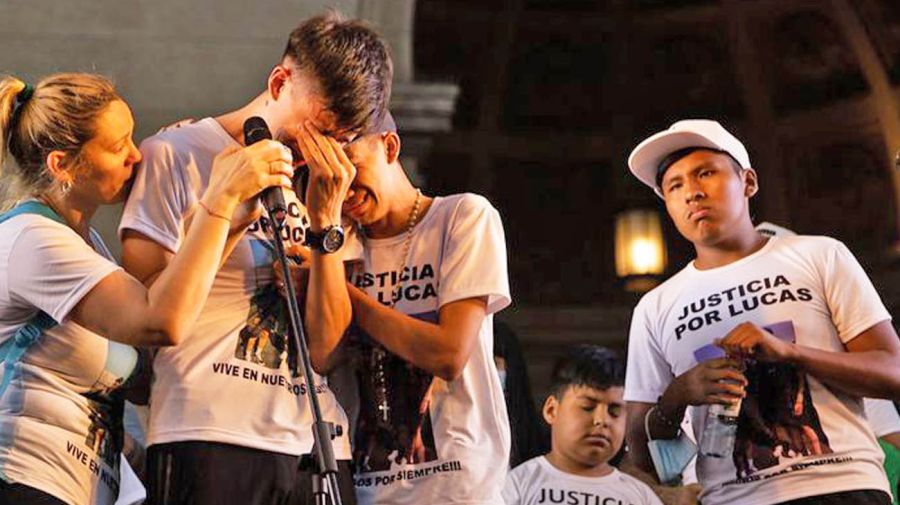









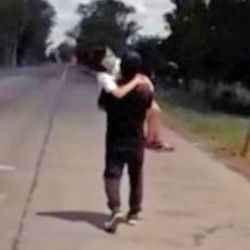
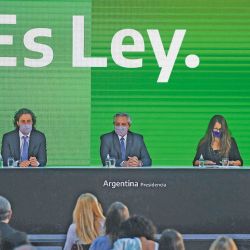
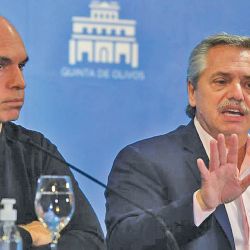

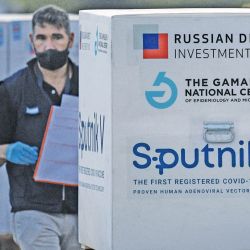


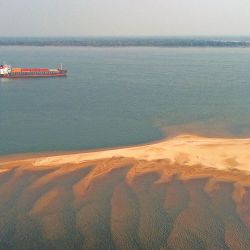






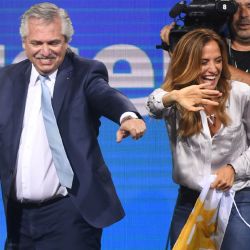

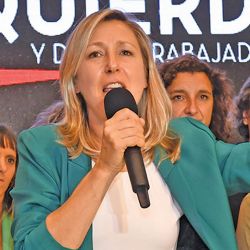

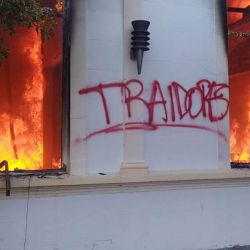













Comments